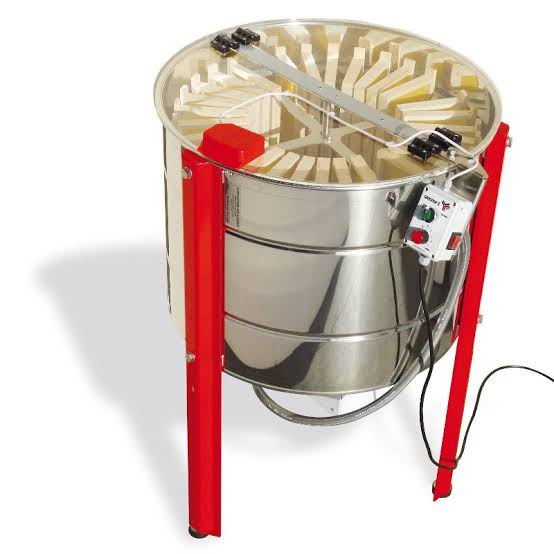
As opposed to manual honey extractors, bee farmers can enjoy harvesting their honey with limited time and energy using an electric honey extractor that uses electricity to spin the frames that are attached on the central shaft located in the middle of the beehive drum.
Electric honey extractor has an electric motor which is connected to an electric current source and can turn the frames at a certain speed.
The honey extractor can be used to extract large amounts in a much quicker time just by a turn of a button. An operator simply turns on the electric motor and the spinning starts automatically.
However, the spinning speed ought to be controlled because if the frames inside the drum are spun at very high speeds, then there is a possibility of damage to the honey combs.
Related News: Kenyan coast beekeepers double honey production from 30 to 60 kilos a year with modern hives
Electronic honey extractor is preferred by large scale commercial beekeepers because they are fast and don’t need much energy to operate. Big commercial honey companies use electric honey extractors due the convenience that such extractors offer.
Small scale bee farmers can go manual with manual honey extractor. It only lacks the electronic motor. Therefore it is manually operated using hands and you can even make it yourself if you’re so technically inclined.
Manual honey extractor exempts farmers from electricity bills among other expenses.
With the rise of many dealers in the honey market like Ngandu Beekeeping Workshop in Thika, Manor House Agricultural Centre in Kitale, Christian Intermediate Training Centre in Kapsabet and Kerio Valley Development Authority in Eldoret among others, farmers can get their various beekeeping equipment depending on affordability and scale of production.
Related News: Honey farmer use iron sheet guards to keep off thieving badgers
Related News: Honey marketer looking for more beekeepers to satisfy the lucrative Arab market
According to the National Farmers Information Service, beekeeping in Kenya contributes close to 4.3 billion Kenya Shillings annually and production is estimated at, 100,000 metric tons annually.
It has therefore become an important enterprise in the livestock sub-sector and there is a ready market for bee products, both locally and internationally.
















Comments powered by CComment